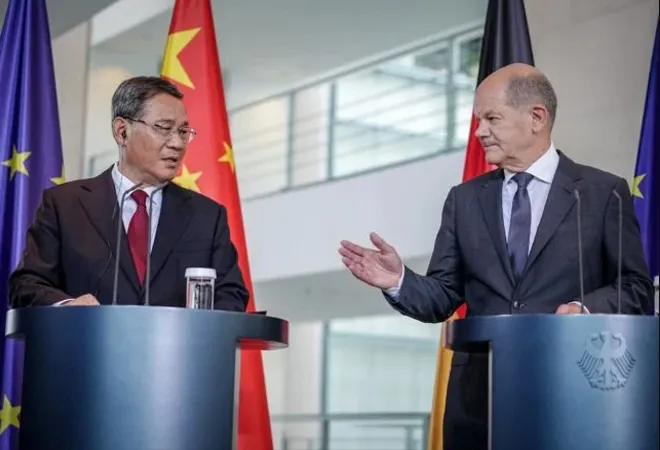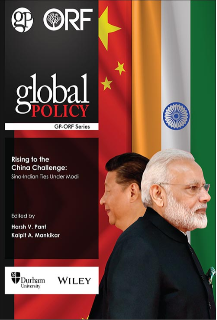
As the economic fulcrum of the European Union (EU), with a quarter of the region’s economy under its geography—
its GDP at US$4.1 trillion is about the size of 20 out of 27 member states, from Belgium to Malta—Germany is attempting to create a new balance of interests with China. This balance pivots around the changing geopolitics, of course. But it is equally influenced and informed by domestic politics. When it comes to the pinch, staying in power seems to take precedence over keeping a few corporations and their risky supply chains afloat.
China’s systemic rivalry with the West is, according to Foreign Minister Annalena Baerbock, beginning to dominate the discourse in Germany. Beijing, she said in a 13 July 2023 speech, will act “
more repressively at home, more assertively abroad.” Since China has changed, Berlin’s China policy will change too, she stated. This is the right direction for Germany. The speech makes all the relevant points. But the lack of any actionable future leaves us wondering whether Berlin thinks Beijing is too big to derail.
When it comes to the pinch, staying in power seems to take precedence over keeping a few corporations and their risky supply chains afloat.
Three legs of Berlin’s China policy
Berlin’s coquettish model of flirting with China on the economic front, while playing hard to get on the security side,
mirroring the EU dalliance with China around the EU-China Comprehensive Agreement on Investment in May 2021, seems to be ending. Released in July 2023, Germany’s new China policy titled,
Strategy on China of the Government of the Federal Republic of Germany, is possibly the first step in that direction, a shift away from denial to acceptance. The change Baerbock talks about as well as Berlin’s China strategy stand on three legs, each carrying its own vulnerability, each providing a face-save to the inadequacy of the West, each allowing China to continue to run amok.
First, accepting the new narrative of ‘de-risk’ rather than ‘decouple,’ Baerbock says that “our aim is not to decouple from China, but to reduce risks as far as possible”. This is a geopolitical cop out and great power mirroring—it is needed, but it is not a statement that’s “Made in Germany” but one that has been “Crafted in the United States (US)”. The final outcome will be the same—the first will be a soft landing, the last a hard landing.
As part of the G7 as well as the North Atlantic Treaty Organisation (NATO), Berlin’s China policy is reluctantly following the strategic lead established by Washington, D.C.
Replacing the word ‘decouple’ with ‘de-risk’ by the Group of Seven (G7)
in its 20 May 2023 Hiroshima Communiqué has brought with it a fuzzy notion of the West’s China engagement. It seems to have just one purpose—buy time and give space to a rogue nation to de-rogue itself, which is not going to happen. Further, as part of the G7 as well as the North Atlantic Treaty Organisation (NATO), Berlin’s China policy is reluctantly following the strategic lead established by Washington, D.C.
As the US wades in the business-as-usual waters of economic opportunities, it does so in a maelstrom of security risks, such as
technological intrusions using 5G. But unlike
India, the US,
the United Kingdom (UK),
Sweden,
Italy,
Bulgaria, Kosovo, North Macedonia and Australia, Germany still hasn’t banned Chinese firms from its 5G rollout. Its government, corporations, universities and citizens stand exposed and vulnerable to huge security and privacy risks if German telecommunications networks use Chinese firms and their intrusive technologies.
But these are small issues in larger conversations. The fact remains that neither the US, nor the EU, and certainly not Germany, is able to call China out. Three decades of feeding their own aspirations of a large market, and fantasies such as China embracing democracy and ending human rights violations, has left the West in the claws of a nation whose security interests are hyphenated with like-minded rogue states such as North Korea and Pakistan. The Chinese Communist Party (CCP), to which is appended a nation called China, has already devoured Hong Kong, while Taiwan has been threatened with a similar fate.
Second, as a corollary, de-risking from China implies diversification into other geographies. It means creating and consolidating new supply chains. So deep is Germany’s China dependence that Berlin is now being forced to seek alternatives to procuring rare earths and other commodities from Africa and Latin America. As part of that de-risking, Germany is pushing the EU to engage the
MERCOSUR, the Southern Common Market comprising five state parties (Argentina, Brazil, Paraguay, Uruguay and Venezuela) and seven associated states in South America through agreements.
Besides raw material sourcing, there is also the question of investment destination. There are three countries where German corporate emigrants from China can find refuge: India, Thailand and Indonesia. All three offer combinations of opportunities. But when it comes to seeking competitive advantage in a fast-growing market at scale, there is only one destination—India (more on this below).
There are three countries where German corporate emigrants from China can find refuge: India, Thailand and Indonesia.
And third, while de-risking from and diversifying into other markets, in a confounding irony of interests, Berlin wants to “expand cooperation with China”. Translating the rhetoric of words into actions of deals is turning out to be more difficult than presumed. So, after all the name-calling and jargon-spewing, hard change on the ground remains on paper and is insignificant. The bogey being used is the climate crisis and China’s role in spewing the crisis as well as in containing it. With it, Berlin transfers the national naiveté around China from technology and trade, which Beijing has weaponised, to climate, which it will weaponise.
Baerbock expects Germany to “cooperate with China, without endangering our liberal democratic order, our prosperity or our partnership with other countries.” This is geopolitical inexperience and a profound lack of understanding of how authoritarian regimes such as China function. The CCP has already breached all liberal orders; it is now
exporting its authoritarian model of governance to Tanzania for instance.
Part of the cooperation stance is rooted in Germany’s universities—“The university in Saxony that offers a research project on artificial intelligence and then has to think about how to handle applications from China,” Baerbock says. Whether that’s a warning to China or to the University remains unclear. But if she lifts her eyes and studies case in the UK, she would know how China has weaponised universities and scholars, and how
‘useful idiots’ there are really ‘conscious conspirators’ serving China.
Companies—the infantry of China policy
The most important aspect of Baerbock’s speech is the implication on German companies that are addicted to China. There is a clear signalling that they are on their own. “Companies that make themselves very dependent on the Chinese market will in future have to bear more of the financial risk themselves,” she said. Further, she placed a new regulatory burden on them: “Economic security also means that companies make sure that human rights are not being violated along their supply chains.” This is something that even governments cannot enforce, leave alone companies. So, translating such policy rhetoric into corporate actions will remain anchored to thin air.
The corporations of various countries are already imagining a less-China or China-free future. The interests of companies are clearer, their actions more accountable on stock markets. Here, the case of India would be worth tracking. Not only have Chinese firms been excluded from its 5G rollouts, even less strategic businesses such as steel, trading or automakers have begun their
decoupling from China.
The interests of companies are clearer, their actions more accountable on stock markets.
On the other side, companies such as Apple and Samsung are creating
new supply chains in India around manufacturing and technology. A rich and deep democracy—despite fake narratives to the contrary—is reducing the risk to firms in a geography that adheres to the rule of law. A young nation, a fast-growing economy, a reforming regulatory infrastructure…all add their weight to this transition. German corporate refugees from China will inevitably follow their US, French and UK counterparts here.
It is no secret that under Xi Jinping and an unhinged Beijing have become the biggest risk to the citizens of the world. The party is intoxicated by its economic success that has been financed, strengthened and handheld by the US and the West, including Germany. Containing China is going to be a core challenge for the next two decades. Five laws, enacted over the past nine years—the Counter-espionage Law (2014), the National Security Law (2015), the National Cybersecurity Law (2016), the National Intelligence Law (2017), and the Personal Information Protection Law (2021)—have ensured that every entity, from companies to citizens, is legally beholden to be a spy. Where is the space to even negotiate?
For democracies to manage the 360-degree swoop of multiple, and often colliding, interests is not easy. Compromises must be made on trade, concessions granted on investments, cooperation needed on security, concerns addressed on jobs. Above all, a competitive domestic politics that can disrupt all these needs to be taken in stride. When it comes to China, ‘balance’ is a fuzzy word, an elusive aspiration. Most of the West has realised it, the EU is possibly beginning to understand it (
Lithuania is a case in point), and Berlin is comprehending it. Rather than a balance, the threat of an authoritarian megalomaniac powered by a party of rogues needs to be disbalanced and all strategic coquetry ended.
Gautam Chikermane is Vice President at the Observer Research Foundation.
The views expressed above belong to the author(s). ORF research and analyses now available on Telegram! Click here to access our curated content — blogs, longforms and interviews.



 As the economic fulcrum of the European Union (EU), with a quarter of the region’s economy under its geography—
As the economic fulcrum of the European Union (EU), with a quarter of the region’s economy under its geography— PREV
PREV


